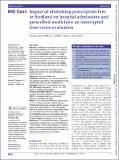Files in this item
Impact of abolishing prescription fees in Scotland on hospital admissions and prescribed medicines : an interrupted time series evaluation
Item metadata
| dc.contributor.author | Williams, Andrew James | |
| dc.contributor.author | Henley, William | |
| dc.contributor.author | Frank, John | |
| dc.date.accessioned | 2020-01-20T12:30:06Z | |
| dc.date.available | 2020-01-20T12:30:06Z | |
| dc.date.issued | 2018-12-18 | |
| dc.identifier | 265789859 | |
| dc.identifier | c8ed29ba-d5e1-487a-a598-c34fbd5243db | |
| dc.identifier | 85058883729 | |
| dc.identifier | 30567818 | |
| dc.identifier.citation | Williams , A J , Henley , W & Frank , J 2018 , ' Impact of abolishing prescription fees in Scotland on hospital admissions and prescribed medicines : an interrupted time series evaluation ' , BMJ Open , vol. 8 , no. 12 , e021318 . https://doi.org/10.1136/bmjopen-2017-021318 | en |
| dc.identifier.issn | 2044-6055 | |
| dc.identifier.other | ORCID: /0000-0002-2175-8836/work/67526153 | |
| dc.identifier.uri | https://hdl.handle.net/10023/19314 | |
| dc.description.abstract | Objectives To identify whether the abolition of prescription fees in Scotland resulted in: (1) Increase in the number (cost to NHS) of medicines prescribed for which there had been a fee (inhaled corticosteroids). (2) Reduction in hospital admissions for conditions related to those medications for which there had been a fee (asthma or chronic obstructive pulmonary disease (COPD))-when both are compared with prescribed medicines and admissions for a condition (diabetes mellitus) for which prescriptions were historically free. Design Natural experimental retrospective general practice level interrupted time series (ITS) analysis using administrative data. Setting General practices, Scotland, UK. Participants 732 (73.6%) general practices across Scotland with valid dispensed medicines and hospital admissions data during the study period (July 2005-December 2013). Intervention Reduction in fees per dispensed item from April 2008 leading to the abolition of the fee in April 2011, resulting in universal free prescriptions. Primary and secondary outcomes Hospital admissions recorded in the Scottish Morbidity Record-01 Inpatient (SMR01) and dispensed medicines recorded in the Prescribing Information System (PIS). Results The ITS analysis identified marked step reductions in adult (19-59 years) admissions related to asthma or COPD (the intervention group), compared with older or young people with the same conditions or adults with diabetes mellitus (the counterfactual groups). The prescription findings were less coherent and subsequent sensitivity analyses found that both the admissions and prescriptions data were highly variable above the annual or seasonal level, limiting the ability to interpret the findings of the ITS analysis. Conclusions This study did not find sufficient evidence that universal free prescriptions was a demonstrably effective or ineffective policy, in terms of reducing hospital admissions or reducing socioeconomic inequality in hospital admissions, in the context of a universal, publicly administered medical care system, the National Health Service of Scotland. | |
| dc.format.extent | 10 | |
| dc.format.extent | 442259 | |
| dc.language.iso | eng | |
| dc.relation.ispartof | BMJ Open | en |
| dc.subject | Administrative data | en |
| dc.subject | Co-payment | en |
| dc.subject | Fees, pharmaceutical | en |
| dc.subject | Interrupted time series | en |
| dc.subject | Natural experiment | en |
| dc.subject | Quasi-experimental | en |
| dc.subject | RA0421 Public health. Hygiene. Preventive Medicine | en |
| dc.subject | RM Therapeutics. Pharmacology | en |
| dc.subject | Medicine(all) | en |
| dc.subject | 3rd-DAS | en |
| dc.subject | BDC | en |
| dc.subject | R2C | en |
| dc.subject | SDG 3 - Good Health and Well-being | en |
| dc.subject.lcc | RA0421 | en |
| dc.subject.lcc | RM | en |
| dc.title | Impact of abolishing prescription fees in Scotland on hospital admissions and prescribed medicines : an interrupted time series evaluation | en |
| dc.type | Journal article | en |
| dc.contributor.institution | University of St Andrews. School of Medicine | en |
| dc.identifier.doi | https://doi.org/10.1136/bmjopen-2017-021318 | |
| dc.description.status | Peer reviewed | en |
This item appears in the following Collection(s)
Items in the St Andrews Research Repository are protected by copyright, with all rights reserved, unless otherwise indicated.

